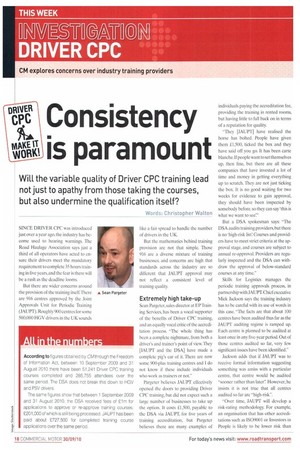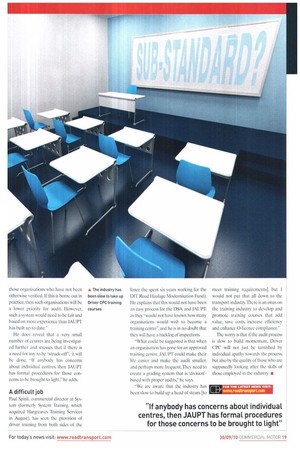Consistency is paramount
Page 18

Page 19

If you've noticed an error in this article please click here to report it so we can fix it.
Will the variable quality of Driver CPC training Lead not just to apathy from those taking the courses, but also undermine the qualification itself?
Words: Christopher Walton
SINCE DRIVER CPC was introduced just over a year ago, the industry has become used to hearing warnings. The Road Haulage Association says just a third of all operators have acted to ensure their drivers meet the mandatory requirement to complete 35 hours training in five years, and the fear is there will be a rush as the deadline looms.
But there are wider concerns around the provision of the training itself. There are 916 centres approved by the Joint Approvals Unit for Periodic Training (JAUPT). Roughly 900 centres for some 500,000 HGV drivers in the UK sounds like a fair spread to handle the number of drivers in the UK.
But the mathematics behind training provision are not that simple. Those 916 are a diverse mixture of training businesses, and concerns are high that standards across the industry are so different that JAUPT approval may not reflect a consistent level of training quality.
Extremely high take-up
Sean Pargeter, sales director at EPTraining Services, has been a vocal supporter of the benefits of Driver CPC training, and an equally vocal critic of the accreditation process -The whole thing has been a complete nightmare, from both a driver's and trainer's point of view. 'They ['ACTT and the DSA] have made a complete pig's ear of it. There are now some 900-plus training centres and I do not know if these include individuals who work as trainers or not."
Pargeter believes MINT effectively opened the doors to providing Driver CPC training, but did not expect such a large number of businesses to take up the option. It costs £1,500, payable to the DSA via JAUPT, for five years of training accreditation, but Pargeter believes there are many examples of individuals paying the accreditation fee, providing the training in rented rooms, but having little to fall back on in terms of a reputation for quality.
"They IJAUPT] have realised the horse has bolted. People have given them £1.500, ticked the box and they have said off you go. It has been carte blanche. If people want to set themselves up, then fine, but there are all these companies that have invested a lot of time and money in getting everything up to scratch. They are not just ticking the box. It is no good waiting for two weeks for evidence to gain approval, they should have been inspected by somebody before, so they can say 'this is what we want to see."
But a DSA spokesman says: "The DSA audits training providers, but there is no 'high-risk list: Courses and providers have to meet strict criteria at the approval stage, and courses are subject to annual re-approval. Providers are regularly inspected and the DSA can withdraw the approval of below-standard courses at any time."
Skills for Logistics manages the periodic training approvals process, in partnership with JAUFT. Chief executive Mick Jackson says the training industry has to be careful with its use of words in this case. "The facts are that about 100 centres have been audited thus far as the JAUPT auditing regime is ramped up. Each centre is planned to be audited at least once in any five-year period. Out of those centres audited so far, very few significant issues have been identified."
Jackson adds that if JAUPT was to receive formal information suggesting something was amiss with a particular centre, that centre would be audited "sooner rather than later'.' However, he insists it is not true that all centres audited so far are "high-risk".
"Over time, JAUPT will develop a risk-rating methodology. For example, an organisation that has other accreditations such as IS09001 or Investors in People is likely to be lower risk than those organisations who have not been otherwise verified. If this is borne out. in practice, then such organisations will be a lower priority for audit. However, such a system would need to be fair and based on more experience than JAUPT has built up to date."
He does reveal that a very small number of centres are being investigated further and stresses that if there is a need for any to be -struck-off", it will be done. "If anybody has concerns about individual centres, then JAUPT has formal procedures for those concerns to be brought to light," he adds.
A difficult job
Paul Spink, commercial director at System (formerly System Training, which acquired Hargreaves Training Services in August), has seen the provision of driver training from both sides of the fence (he spent six years working for the Df I' Road Haulage Modernisation Fund). He explains that this would not have been an easy process for the DSA and JAUPT. as they ''would not have known how many organisations would wish to become a training centre", and he is in no doubt that they will have a backlog of inspections.
"What could be suggested is that when an organisation has gone for an approved training centre, JAUPT could make their life easier and make the audit smaller, and perhaps more frequent. They need to create a grading system that is 'division'based with proper audits," he says.
"We are aware that the industry has been slow to build up a head of steam [to meet training requirements], but I would not put that all down to the transport industry There is an onus on the training industry to develop and promote training courses that add value, save costs, increase efficiency and enhance 0-licence compliance."
The worry is that if the audit process is slow to build momentum, Driver CPC will not just be tarnished by individual apathy towards the process, but also by the quality of those who are supposedly looking after the skills of those employed in the industry •




























































































































